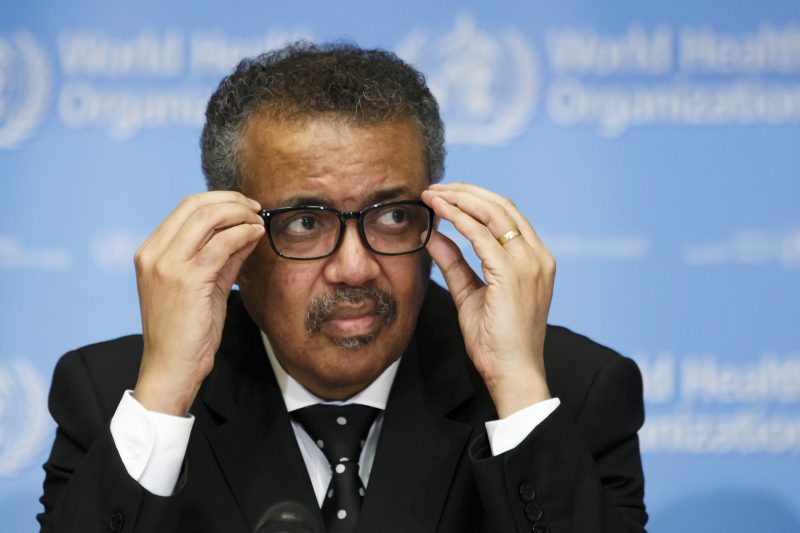
The director general of World Health Organisation, (WHO), Tedros Ghebreyesus, has said adequate investment in primary care centres (PHCs) will guarantee the attainment of a 6.7 years increase in life expectancy globally.
Mr Ghebreyesus spoke at the ongoing World Health Assembly in Geneva, Switzerland, while delivering a lecture titled; “Radical Reorientation of Health Systems Towards Primary Health Care as the Foundation of Universal Health Coverage: The Best and Only Choice to Achieve Universal Health Coverage.”
He said the benefits of investing in primary health care are enormous for promoting health, preventing diseases, advancing equity and health security. He added that it will help to build more resilient health systems.
He said; “At present, health spending in most countries is imbalanced towards secondary and tertiary care. By contrast, 90 per cent of essential health services can be delivered through primary health care.
“We estimate that investing in primary health care could increase global life expectancy by as much as 6.7 years by 2030. Don’t get me wrong, secondary and tertiary care are very important. People will get sick and require high quality specialist care. But in too many countries, primary health care has been neglected.”
Support
The director general, who has just been reelected at the ongoing assembly for another five-year tenure of office, said WHO is calling on countries to make a radical reorientation of their health systems towards primary health care.
He added that WHO is also supporting countries in five key ways.
He said; “First, we have established a special programme on primary health care that will share practical and scalable policies along with technical support.
“Second, through the Universal Health Coverage (UHC) partnership, we have deployed health policy advisors in 115 country offices to support implementation of primary health care strategies. And we are seeking a budget increase to radically accelerate our support in certain countries with a low UHC index.
“We are integrating these programmes into an essential health package of services as part of the reorientation to primary health care.
“Fourth, we will help to disseminate local innovations from champion Primary Health Care countries, in particular, the use of digital technology and help countries incorporate these innovations in their investment plans.”
He added that the fifth intervention is that WHO is working with partners through UHC to 2030 and the global action plan for healthy lives and wellbeing “for all to accelerate Primary Health Care implementation in countries.”
“Supporting countries to make this reorientation will be a key focus of our work at all three levels over the next five years,” Mr Ghebreyesus said.
Brain Drain: Like Nigeria, like Jamaica
Speaking at the event, one of the panelists and minister of health, Jamaica, Christopher Tufton, said just like Nigeria, his country is experiencing enormous mass migration of its health workers.
Mr Tufton said although his country’s primary health care system has been a model for neighbouring countries since the 1990s, the challenges that they face as a country is lack of human resource.
He said; “Mass migration of our healthcare workers is a significant strain on small island developing states like ours. We have a reputation for having excellent health care workers, and our nurses in particular, are world famous.
“They are also world demanded, well recruited, and they are compensated significantly higher than we could ever do as a developing country. And our very closest neighbours who we appreciate and respect clearly represent extremely attractive places for them to be recruited in and they do go for economic reasons primarily.”
Collaboration
The minister said another challenge that his country will face is how to advance a programme of collaboration around expanding her healthcare human resource potential.
He said his country is not against mobility of labour, but what he described as inequality of health care and access to health care.
The minister said the coronavirus pandemic will demonstrate a shift of healthcare human resources from the developing world to the developed. He said since the developed world recognises the need for more capacity, it will offer more attractive packages for labour.
“But I do believe that collaboration can be stronger. I am talking about clinical rotation; I am talking about flexible contracts to allow persons to work in different jurisdictions; I am talking about faculty and the exchange of faculty.
“And this is part of my own mantra as minister of health of a small island state speaking not just on behalf of Jamaica, but on behalf of the region,” Mr Tufton said.
He called for WHO’s assistance in that regard, saying “it is one thing to have the infrastructure, if we have no people to manage, then the credibility is further eroded.”
WATCH: Governor Yahaya Bello’s Roadmap to Hope 2023

Support PREMIUM TIMES’ journalism of integrity and credibility
Good journalism costs a lot of money. Yet only good journalism can ensure the possibility of a good society, an accountable democracy, and a transparent government.
For continued free access to the best investigative journalism in the country we ask you to consider making a modest support to this noble endeavour.
By contributing to PREMIUM TIMES, you are helping to sustain a journalism of relevance and ensuring it remains free and available to all.
Donate
TEXT AD: Why women cheat: what every Nigerian man should know



0 Comments